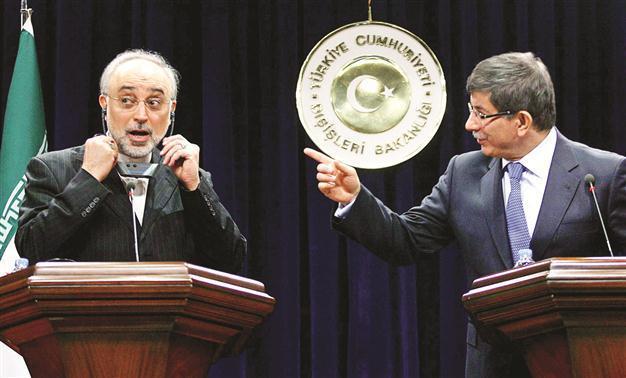Ankara cautious on hosting Iran talks
TEHRAN/ANKARA

Turkish Foreign Minister Davutoglu (R) his Iranian counterpart Salehi speak to the media after their talks in Ankara on Jan 19, 2012. Salehi said yesterday that Istanbul will host talks between Iran and P+1 on Islamic Republic’s nuclear program but Turkey did not confirm
The next round of talks between Iran and six world powers on the Islamic republic’s nuclear program will be held in Istanbul, Iran’s foreign minister said yesterday in Tehran, the Associated Press reported.According to the semi-official Iranian Mehr news agency, Iran proposed Istanbul as the venue of talks in Supreme National Security Council Secretary Saeed Jalili’s letter to EU Foreign Policy chief Catherine Ashton. The agency added that this proposal had been accepted by Turkish Foreign Minister Ahmet Davutoğlu and Ashton, who represents the P5+1 group consisting of the United States, Britain, France, Russia, China and Germany.
Addressing the date of the talks, Salehi said in the letter that Jalili had called for the resumption of talks as soon as possible. “We are waiting for the response.”
Turkey calls for ‘intensified talks’
However, there was no confirmation by Turkey late yesterday that new rounds of talks over Iran’s nuclear program would be held in Istanbul as announced by Salehi.
With concerns that Iran was using the meetings in order to reduce the international pressure exerted by Western powers and to buy more time, Turkey did not seem enthusiastic when the possibility first came to the agenda. Foreign Minister Ahmet Davutoğlu, who held intensive talks with his U.S. counterpart, Hillary Clinton, last week in Washington, said the meeting should be held with an eye to finding a solution.
“They should come together and not leave the meetings until they solve the problem. They should not come together for just one meeting and resume talks a year after and experience the same difficulties and processes. We hope there will be a solution if both parties concentrate on achieving a breakthrough,” he said.
The last round of talks between Iran and the five permanent members of the P5+1 were held in Istanbul in January 2011 but ended in failure. The West wants Iran to meet U.N. Security Council demands to stop uranium enrichment but Tehran has accused the other side of pushing not “dialogue but dictation.” The U.S. and its allies accuse Iran of seeking to develop nuclear weapons, while Iran maintains its nuclear program is entirely peaceful.
“We are looking for a mechanism for a solution for the nuclear issue in a way that it is win-win for both sides,” Salehi said at a joint media conference with his visiting Nicaraguan counterpart.
“We understand the other side’s position and we want them to have conditions to save face. We are going into the talks with a positive outlook and we hope they will come to the negotiations with goodwill.”
Iran has sent a letter replying to an EU offer made in October to resurrect the talks that collapsed in Istanbul in January 2011. The EU and the U.S. greeted the Iranian reply with cautious optimism, with Ashton, who made the October offer, calling it “an important step” amid high international tensions over Iran.
The United Nations and the West have imposed a raft of sanctions on Iran in an unsuccessful effort to force it to halt its atomic activities. The Western measures have badly impacted Iran’s economy, but Tehran has responded by ramping up its uranium enrichment.
Two principles
For Turkey, the negotiations should be built on two principles. The first one is that Iran should guarantee that its nuclear program will have no sort of military dimension while the second is that the right to develop nuclear technology for peaceful purposes should also be given to Iran. Turkish diplomats have said Turkey will not take part in the negotiations but will provide logistical support, as well as security, for the parties.
Salehi’s announcement came a day before an International Atomic Energy Agency delegation is expected in Tehran to hold two days of talks with Iranian officials on the suspicions. A previous visit on the same issue at the end of January yielded no breakthrough.
















